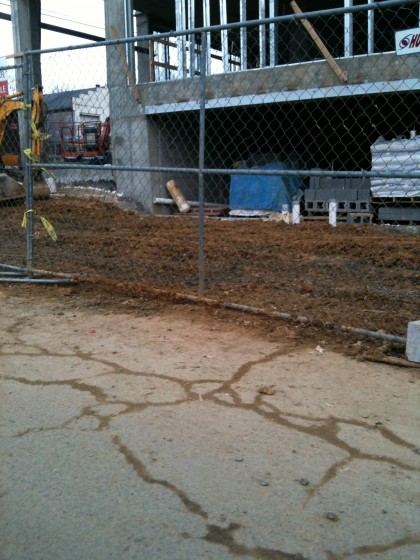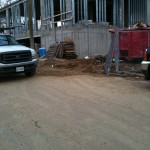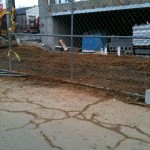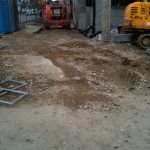RECENT COMMENTS
Joel Cabot on Power Outage on the Hill
Eric S. Huffstutler on What is up with the Church Hill Post Office?
Eric S. Huffstutler on What is up with the Church Hill Post Office?
Yvette Cannon on What is up with the Church Hill Post Office?
crd on Power Outage on the Hill
Local construction sending sediment to James and Chesapeake?
02/06/2011 5:15 AM by John M
No wonder the James River and the Chesapeake Bay are overburden with nutrient and sediment pollution! Sediment from construction sites like the one pictured at 20th and Broad St. in Church Hill are a big part of the problem.
Just for the record, there are plenty of options for developers to make sure sediment stays on site during construction instead of flowing into our streets, stormdrains, and waterways everytime it rains.
Sent in by Kristin.
TAGGED: environment










So where are the inspectors that are supposed to flag this kind of violation? Where is the accountability?
Good points! Someone know who to inquire about the enforcement?
S. Kelly, I don’t know but I’d start with calling the Chesapeake Bay Foundation…I would think they’d know who enforces things like this, wouldn’t they?
I thought of Dept. of Environmental Quality (DEQ) but they are a state agency and I think it would be more likely one would find a helpful person on the other end of the phone at some place like CBF. My phone book is old but lists CBF at 1108 East Main, 780-1392. If they are still in that location they’d be likely to understand the location of the buildings pictured. I don’t think they do enforcement but perhaps they have quick access to the correct agency.
This is where fines should be applied if violations are found.
Citizens are paying their stormwater utility fees, so the City should be on top of their game when it comes to this.
My guess is our city government doesn’t care about the environment as long as these contractors are paying their taxes. Good luck.
violations such as these should be reported to the city of richmond’s DPU (dept. of public utilities) (804)646-5203 is the number to their director’s office. the state’s regulations (chesapeake bay act) don’t apply to this site or many others in richmond because the sediment and runoff goes to the city’s treatment plant (because we have a combined system of stormwater and sewer) so it is technically treated before entering the river. so the state agencies don’t have jurisdiction. just the city. so call or email them and complain. i do it all the time!
http://eservices.ci.richmond.va.us/applications/RichmondGovContactUs/ContactUs.aspx?ID=31
OK, probably, the easiest way to capture sediment from a tight sight like this would be to put filters down at the closest, downstream storm drains, so if those aren’t shown, it’s hard to know if they aren’t doing anything.
Second, let’s all take a deep breath and think about this for a moment. While we certainly need to limit sediment run off from all construction sites, this site is not even 3/4ths of an acre and the site will eventually have 74 dwelling units plus some ground floor commercial space. Compare that to the typical development project in the suburbs, where 74 dwelling units would probably require 10-15 acres (assuming a very reasonable 5 units per acre) plus whatever additional land would be required for the commercial space, parking and new roads associated with that many dwelling units. The sediment runoff during construction of such a suburban project, even with some basic capture mechanisms, would almost certainly dwarf the runoff from this site many times over. I don’t doubt that everyone is deeply concerned with the health of the James, but I really think we all need to have some perspective on how we deal with these issues. We really need to be focusing our efforts on making the developers out in Henrico, Hanover, Goochland and Chesterfield clean up their acts because that’s where the problem really is.
the sky is falling the sky is falling
@6- Agreed. This work site is not a great example for the assertion that the sediment is polluting the James. It’s highly unlikely that any of this runoff would make it to the James without first hitting the treatment facility. The storm drains on 20th Street, Main, and Cary would certainly catch the sediment. Most stormwater in the city is treated except in extreme situations.
In addition to the info @6 posted, the City’s call in number is 644-3000. They are supposed to get in touch with staff that will address the problem.
I will say though that I did call the City first and got no interest from them to address the problem. I then called the Department of Conservation and Recreation and they sent an inspector out to the site a few hours later.
The contractor has agreed to put gravel down at the site entrances and indicated to the inspector that they planned to do so as soon as possible.
@7 and @9, I completely disagree with the notion that it is okay to send what is likely several tons of sediment to the Richmond wastewater treatment plant. Do the math! It is far more cost-effective to keep sediment out of wastewater to begin with, than it is to remove it and then haul it for disposal elsewhere. Do you guys have any idea how much it costs to land apply wastewater treatment solids? Is it fair for taxpayers to pay for sloppy management on the part of developers?
Further, the concept that a heavy rainfall will deliver sediment to the wastewater treatment plant completely misses the point of a combined sewer overflow system. When it rains heavily, that is when stormwater and wastewater throughout the city are discharged directly, with no treatment, to the James River. In some areas of the City, it is remarkable(and sad and shocking) how little rainfall it takes for this to happen.
The bottom line is that there are simple, well-known, widely used best management practices that developers can and should be using to prevent sediment loss form land disturbance.
The site at 20th and Broad is simply a reflection of what happens when the City doesn’t enforce the law and developers don’t care to do the right thing without the threat of fines.
Kristen,
My main point here wasn’t that these developers are perfect; clearly they could be doing better. My point is in the larger scheme of things, this site is a much smaller contributor to the overall sediment problem than much larger and much more numerous suburban developments.
My secondary point is the since this development is much higher density and in an already developed area compared to suburban development, the overall environmental impact is much lower including the runoff impacts. Therefore, we all ought to be focusing more time and attention on the runoff problems from suburban developments.
@10 I never stated the sending sediment to the wastewater treatment plant was acceptable. I was simply responding to your direct assertion from the thread starter that sediment from this site was one of the contributors to pollution in the James. This is largely a false statement although I appreciate your concerns. I merely implied that you should have chosen a better example to illustrate your point about the James.
Fred and Elena, while we might disagree over a few details, it sounds like we are all on the same page when it comes to acknowledging that sediment from development is a water quality problem. I appreciate your thoughtful responses and am grateful that we have the opportunity to have a dialogue about this and other Church Hill issues on chpn.net.
Good night!
Kristen
Sadly, some of the biggest polluters of the James these days are farms and the run off is very difficult to control and enforce.
Add to that all those geese and seagulls fouling the waters (pun intended) and you have quite nice slurry.
Kristen,
Thank you for bringing this to the attention of the community!!
Libby Hill Resident is correct. I met a guy in waste management and water treatment while flying back to RVA. I asked him why the James is so heavily polluted. He explained about the runoff from the farm lands and how difficult it was to control it. Seems like we need to police upstream like we supposedly do here in the city.
Yeah, we should do everything possible to keep dirt from getting into the river.
I have been made aware of the fact that DCR immediately contacted the lead inspector for the City and that he has visited the site three times since this post went up and insisted upon remedial measures. Great work, CHPN community.
instead of talking about a couple of patches of dirt running off into the james river what about a couple of years ago when the streets in church hill were redone to reflect a more historic look. All those little pebbles ran off into the river after the first big rain. Talk about a waste of money and increased sediment in the river…
Kudos to DCR! The developer has installed erosion control systems and it looks like soil loss from the site will be greatly reduced.